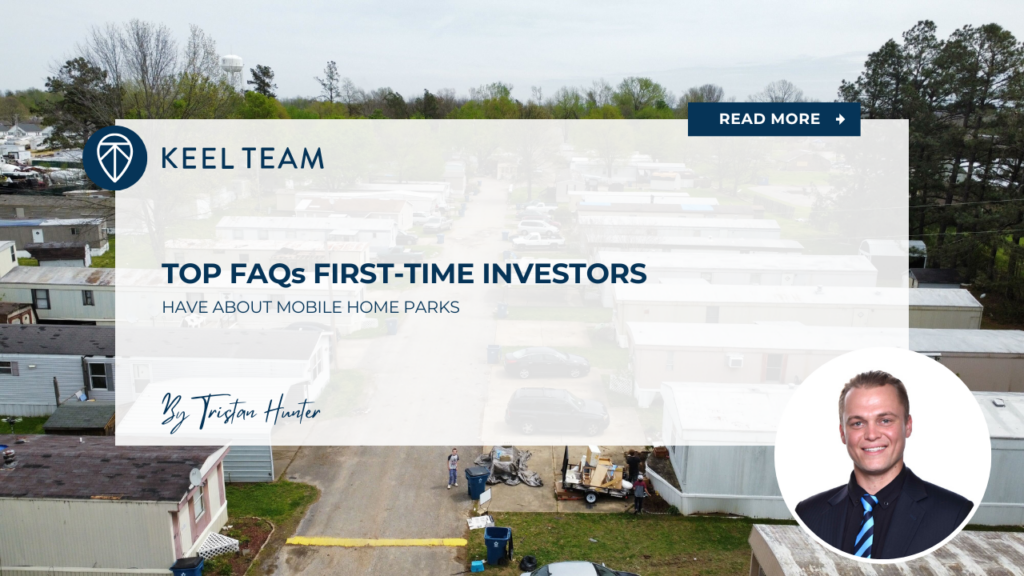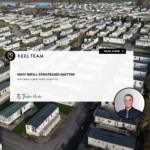Top FAQs First-Time Investors Have About Mobile Home Parks
-
 Tristan Hunter - Investor Relations
Tristan Hunter - Investor Relations

Investing in mobile home parks as a passive investor can seem daunting at first. But with the right knowledge, it’s possible to navigate this niche with confidence. This article answers common questions first-time passive investors have about mobile home park investing, providing beginner passive mobile home park investing tips to help you get started.
What Does It Mean to Be a Passive Investor in Mobile Home Parks?
Passive investors provide capital for mobile home park investments without being directly involved in the day-to-day management. Instead, they partner with experienced operators or syndicators who handle operations, tenant relations, and property improvements.
By investing passively, you might focus on funding deals, reviewing financial performance, and receiving distributions. This approach could be ideal for individuals looking to invest without the time or expertise needed to manage a mobile home park themselves.
Why Should I Consider Mobile Home Parks as a Passive Investment?
Mobile home parks can offer several potential benefits for passive investors:
- Affordable Housing Demand: Mobile home parks are often in demand because they provide affordable housing options.
- Recession-Resistant Characteristics: Many investors view mobile home parks as relatively stable investments, even during economic downturns.
- Scalability: Investing in larger properties may allow for more tenants and diversified income streams.
While these aspects are appealing, it’s important to understand the risks and perform due diligence before making any investment decisions.
Download our FREE eBook on the Top 10 things to know BEFORE investing passively in mobile home parks!
How Do I Choose the Right Mobile Home Park Syndicator or Operator?
Partnering with the right syndicator or operator can make or break your passive investment experience. Here are some tips for evaluating potential partners:
- Experience: Look for operators with a track record of managing mobile home parks successfully.
- Transparency: Choose someone who communicates clearly and provides regular updates on the property’s performance.
- Strategy Alignment: Ensure their investment strategy matches your goals, whether that’s long-term cash flow or value-add opportunities.
Take time to research and ask questions. Trust and alignment are key when selecting an operator.
What Should I Look for in a Mobile Home Park Investment Opportunity?
Evaluating a mobile home park opportunity involves several factors:
- Location: Properties in growing markets with strong employment opportunities often attract more tenants.
- Occupancy Rates: Higher occupancy rates might indicate stable tenant demand.
- Infrastructure: Consider properties with well-maintained infrastructure, like roads, utilities, and community amenities.
- Lot Ownership: Trailer parks where tenants own their mobile homes might reduce management complexity and maintenance costs.
These factors, combined with financial analysis, can help you determine whether a specific opportunity aligns with your investment goals.
How Much Money Do I Need to Invest Passively in a Mobile Home Park?
The minimum investment amount varies by syndicator or deal. Some opportunities may require as little as $25,000, while others might have higher thresholds.
Consider how much you’re comfortable investing, and ensure the deal’s risk level aligns with your financial situation. Diversifying your investments across multiple properties could also help spread risk.
What Are the Risks of Passive Mobile Home Park Investing?
All investments typically come with risks, and mobile home park investing is no exception. Common risks include:
- Economic Downturns: Changes in the economy could impact tenant stability.
- Operational Issues: Poor management might lead to higher expenses or lower occupancy.
- Market Saturation: Some areas may have limited tenant demand due to oversupply.
Understanding these risks and working with experienced operators may help mitigate potential downsides.

What Returns Can I Expect from Passive Mobile Home Park Investments?
Returns vary based on the deal, location, and management. Many investors aim for cash flow and long-term appreciation, but it’s important to have realistic expectations. Passive investors might receive regular distributions, often quarterly, along with potential profits when the property is sold.
It’s worth noting that past performance doesn’t guarantee future results. Always review financial projections carefully.
How Do Taxes Work for Passive Investors in Mobile Home Parks?
Passive investors may benefit from tax advantages, such as:
- Depreciation: Mobile home park structures and infrastructure can be depreciated, potentially reducing taxable income.
- Passive Income: Distributions are often taxed differently than active income.
- 1031 Exchanges: Some investors reinvest profits into new properties to defer capital gains taxes.
Consult with a tax professional to understand how investing in mobile home parks might impact your tax situation.
How Do I Get Started with My First Passive Mobile Home Park Investment?
Starting your journey as a passive investor involves several steps:
- Educate Yourself: Learn about the mobile home park industry, investment structures, and potential risks.
- Set Goals: Define what you want to achieve, whether it’s cash flow, long-term growth, or diversification.
- Find Opportunities: Network with syndicators, attend industry events, or join investor groups.
- Perform Due Diligence: Carefully evaluate deals and operators before committing your capital.
- Monitor Your Investment: Stay informed about the property’s performance and communicate with your operator regularly.
By taking these steps, you may build confidence and increase your chances of success.
What Resources Are Available for Learning About Mobile Home Park Investing?
There are plenty of resources to help passive investors:
- Books: Titles on mobile home park investing and passive real estate strategies.
- Podcasts: Shows that cover industry trends and expert insights.
- Webinars: Online sessions hosted by syndicators or industry professionals.
- Networking Groups: Local or online groups for passive real estate investors.
Investing time in education might pay off as you explore mobile home park opportunities.
Final Thoughts
Passive mobile home park investing offers a unique opportunity to diversify your portfolio and potentially generate passive income. However, it’s essential to ask the right questions, research thoroughly, and align with experienced partners.
By understanding the basics and seeking guidance from reliable sources, you can take meaningful steps toward exploring this rewarding investment strategy.
Are you looking for MORE information? Book a 1-on-1 consultation with Andrew Keel to discuss:
- A mobile home park deal review
- Due diligence questions
- How to raise capital from investors
- Mistakes to avoid, and more!
Disclaimer:
The information provided is for informational purposes only and is not investment advice or a guarantee of any kind. We do not guarantee profitability. Make investment decisions based on your own research and consult registered financial and legal professionals. We are not registered financial or legal professionals and do not provide personalized investment recommendations.

Tristan Hunter - Investor Relations
View The Previous or Next Post
Subscribe Below 👇





